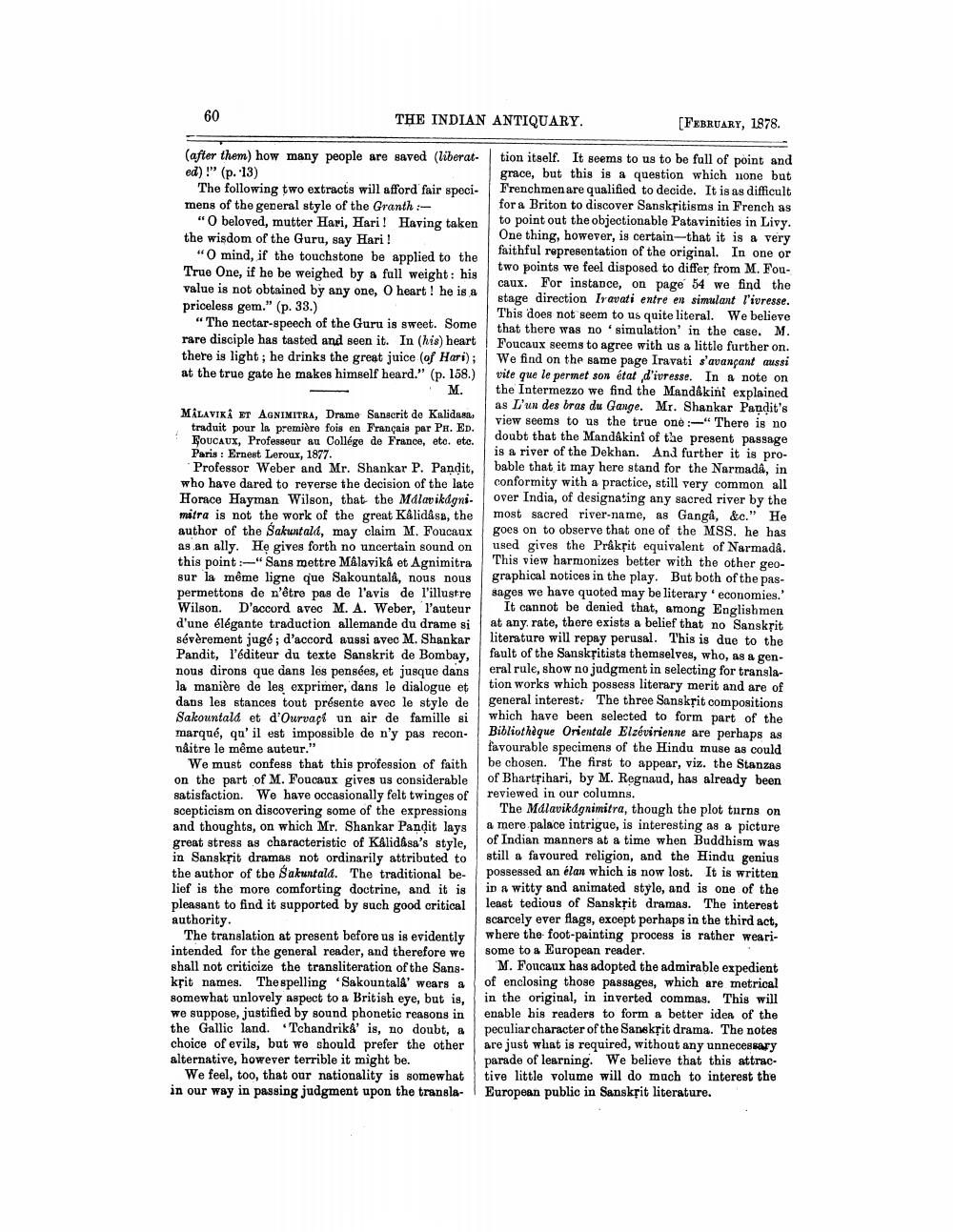________________
THE INDIAN ANTIQUARY.
[FEBRUARY, 1878.
(after them) how many people are saved (liberat- tion itself. It seems to us to be full of point and ed)!” (p. 13)
grace, but this is a question which none but The following two extracts will afford fair speci- Frenchmen are qualified to decide. It is as difficult mens of the general style of the Granth :
for a Briton to discover Sanskritisms in French as "O beloved, mutter Hari, Hari! Having taken
to point out the objectionable Patavinities in Livy. the wisdom of the Guru, say Hari!
One thing, however, is certain-that it is a very "O mind, if the touchstone be applied to the
faithful representation of the original. In one or True One, if he be weighed by a full weight: his
two points we feel disposed to differ from M. Fou
caux. For instance, on page 54 we find the value is not obtained by any one, O heart ! he is a
stage direction Iravati entre en simulant l'ivresse. priceless gem." (p. 33.)
This does not seem to us quite literal. We believe "The nectar-speech of the Guru is sweet. Some
that there was no simulation' in the case. M. rare disciple has tasted and seen it. In (his) heart
Foucaux seems to agree with us a little further on. there is light; he drinks the great juice (of Hari); We find on the same page Iravati s'avançant aussi at the true gate he makes himself heard." (p. 158.) vite que le permet son état d'ivresse. In a note on
M.
the Intermezzo we find the Mandakini explained
as l'un des bras du Gange. Mr. Shankar Pandit's MALAVIKA ET AGNIMITRA, Drame Sanscrit de Kalidasa
view seems to us the true one :-" There is no traduit pour la première fois en Français par Ph. ED.
doubt that the Mandakini of the present passage FOUCAUX, Professeur au Collége de France, etc. etc. Paris : Ernest Leroux, 1877.
is a river of the Dekhan. And further it is proProfessor Weber and Mr. Shankar P. Pandit, bable that it may here stand for the Narmada, in who have dared to reverse the decision of the late conformity with a practice, still very common all Horace Hayman Wilson, that the Malavikagni. over India, of designating any sacred river by the matra is not the work of the great Kalidasa, the most sacred river-name, as Ganga, &c." He author of the Sakuntala, may claim M. Foucaux goes on to observe that one of the MSS. he has as an ally. He gives forth no uncertain sound on used gives the Prakpit equivalent of Narmada. this point :-"Sans mettre Malavika et Agnimitra This view harmonizes better with the other geosur la même ligne que Sakountala, nous nous graphical notices in the play. But both of the paspermettons de n'être pas de l'avis de l'illustre sages we have quoted may be literary economies.' Wilson. D'accord avec M. A. Weber, l'auteur
It cannot be denied that, among Englishmen d'une élégante traduction allemande du drame si at any rate, there exists a belief that no Sanskrit sévèrement jugé; d'accord aussi avec M. Shankar literature will repay perusal. This is due to the Pandit, l'éditeur du texte Sanskrit de Bombay, fault of the Sansksitists themselves, who, as a gennous dirons que dans les pensées, et jusque dans eral rule, show no judgment in selecting for translala manière de les exprimer, dans le dialogue et tion works which possess literary merit and are of dans les stances tout présente avec le style de
general interest: The three Sanskrit compositions Sakountala et d'Ourvaci un air de famille si
which have been selected to form part of the marqué, qu'il est impossible de n'y pas recon
Bibliothèque Orientale Elzévirienne are perhaps as naitre le même auteur."
favourable specimens of the Hindu muse as could We must confess that this profession of faith be chosen. The first to appear, viz. the Stanzas on the part of M. Foucaux gives us considerable of Bhartřihari, by M. Regnaud, has already been satisfaction. We have occasionally felt twinges of
have occasionally felt twinges of reviewed in our columns scepticism on discovering some of the expressions The Malavikugnimitra, though the plot turns on and thoughts, on which Mr. Shankar Pandit lays a mere palace intrigue, is interesting as a picture great stress as characteristic of Kalidasa's style of Indian manners at a time when Buddhism was in Sanskrit dramas not ordinarily attributed to
still a favoured religion, and the Hindu genius the author of the Sakuntald. The traditional be- possessed an élan which is now lost. It is written lief is the more comforting doctrine, and it is in a witty and animated style, and is one of the pleasant to find it supported by such good critical least tedious of Sanskțit dramas. The interest authority.
scarcely ever flags, except perhaps in the third act, The translation at present before us is evidently
where the foot-painting process is rather weariintended for the general reader, and therefore we some to a European reader. shall not criticize the transliteration of the Sans- M. Foucaux has adopted the admirable expedient krit names. The spelling 'Sakountal' wears a of enclosing those passages, which are metrical somewhat unlovely aspect to a British eye, but is, in the original, in inverted commag. This will we suppose, justified by sound phonetic reasons in enable his readers to form a better idea of the the Gallic land. Tchandrika' is, no doubt, & peculiar character of the Sansksit drama. The notes choice of evils, but we should prefer the other are just wliat is required, without any unnecessary alternative, however terrible it might be.
parade of learning. We believe that this attracWe feel, too, that our nationality is somewhat tive little volume will do much to interest the in our way in passing judgment upon the transla- European public in Sanskrit literature.




